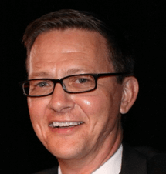‘Resilience for Changing Times’ Programme: Q&A with Paul Williamson
Research from McKinsey and Company shows that 70% of all organisational change initiatives fail. One part of the solution to this is to build resilience.

Why is the subject of resilience important right now?
I think people’s resilience is being tested now to a greater degree than ever before. The Covid-19 pandemic has impacted on everyone’s lives in countless ways and created an unprecedented amount of change. For some people, adapting to working from home has stretched them in terms of work/life balance, other people have had to contend with home schooling too. For some, adjusting to being temporarily furloughed has been a big adjustment, others have lost their jobs through redundancy, so suddenly found themselves needing to compete for roles in an increasingly competitive employment marketplace. Those who continue to work now might find themselves part of much smaller teams, often with an increase in the volume of work to contend with. Worries about the economy, and the precarious future of many well-known businesses and organisations also weighs heavily on many people’s minds. Other businesses are booming and perhaps struggling to cope with demand and the sheer quantity of work to do.For further details and to reserve a place on the online workshop please email events@relocatemagazine.com or call the Relocate Global and Think Global People team on +44 (0)1892 891334.
Human beings are hard-wired to want to connect with other human-beings, and this has become much more difficult. Many of the things we took for granted in the past are now not possible, like being able to see someone’s facial expressions (now obscured in some circumstances by a face mask), or being able to get a hug from a friend or loved one when we’re feeling down, is now only possible if that person is in our ‘bubble’. We avoid close contact with people, sometimes crossing the street to keep our distance.Given all these changes and the fact so many of them are completely beyond our control, it is easy to allow our emotions to get the better of us, or to get overwhelmed by the degree of change.All change requires energy and lots of it. With most change comes the requirement to learn a new way of doing things. This exposes individuals, teams and organisations to the unknown, and the unknown can be frightening, sometimes exciting – frequently both. When we’re dealing with the unknown, we never know how it will work out, whether we’ll struggle or thrive, whether it will be easy or challenging, and inevitably we’ll find ourselves in that familiar cycle of working through feelings associated with growing our level of competence. When we’re learning something new, there’s always that stage where we’re hyper-aware of being ‘consciously incompetent’ and that can be deeply uncomfortable. So, with change, also comes vulnerability – it’s an inescapable aspect of the process that is often ignored or down-played.Research from McKinsey and Company shows that 70% of all organisational change initiatives fail. That’s an astonishing statistic and indicates traditional approaches to managing change are serving us poorly. What’s the answer then? Well part of the answer I think is to invest in building resilience, and this has to start on an individual basis.A good place to start is at the top. In my view senior leaders who model the right behaviours and attend to their own resilience and wellbeing first, are much more likely to cultivate a healthy, prosperous business. Leaders like this create cultures which retain talent, engage people and foster a resilient community. A resilient workforce will reward an organisation by investing energy, creativity and resourcefulness into overcoming adversity, and they will learn from the experience – which ultimately creates strength for the future.One of the issues I frequently see present itself comes from a fundamental misunderstanding of what resilience actually is. Many people define resilience as a kind of toughening-up process. Putting on armour so you can battle through. A state where you remain rigid and fundamentally unwilling to change, where you push through adversity and then then bounce back to what you were before. This approach usually has a narrowing effect on people’s creativity and resourcefulness, limiting a person’s capacity to accept change and work with whatever emerges. I think we have all seen examples of this in life. Where we see a person plough on regardless, like a bulldozer, pushing through a change with determination and force. It rarely ends well.Resilience is actually all about flexibility - it’s the complete opposite of rigidity. When we’re resilient we are free to move around, to stretch and take the strain. We have access to our resourcefulness and creativity, and invest our energy wisely in the right activities to get the best results. We accept change and work with it, not against it, we are agile and adapt to new circumstances and challenges, keeping perspective.The good news is, we are all naturally resilient and by investing some time and reflection into recognising this and growing our capacity in this area serves us, and those around us extremely well.
Why should people attend?
With so many demands on our time and the scale of change and difficulty we’re experiencing during this moment in history, I would say everyone needs to invest time and energy into renewal and reflection and this programme offers just that opportunity.Increasing resilience allows us to flex and adapt during challenging times and achieve so much more than we anticipated. The collective impact of knowingly implementing the simple techniques and strategies covered in this programme will enable participants to develop a reliable model of resilience they can return to time and time again, and continue to refine and develop over many years to come.Attending this programme is an investment in you and a great opportunity to connect with like-minded people, be part of a global community, share experiences and learn with, and from, other participants.
Who should attend?
Resilience is a subject that everyone would benefit from giving more attention to. No matter what you do, where you live, or what job you do; your ability to succeed will, at some stage; depend on how resilient you are.Leaders carry the burden of accountability and responsibility, which can weigh heavily. Making sound decisions, maintaining access to rational thought during pressured times, and being agile and flexible during times of change is essential in order to get positive results, maintain relationships and protect your reputation, none of which can be achieved without resilience.Similarly, managers and team leaders will benefit from learning concepts and principles designed to build and maintain resilience in order to perform at their best and contribute to a positive working culture that supports high performing teams, retains talent and achieves results.HR professionals will have access to tools that will enable them to positively impact levels of resilience within their organisation and partner with their business to support positive change.
What can people expect from the programme?
Over three 90 minute sessions, participants will get the opportunity to connect with the true meaning of resilience and engage in some reflection about themselves, identify key aspects of their character and personality that will help them tap into their natural resilience. Using the findings of recent research, we’ll also explore 5 key areas that contribute to psychological resilience. Each session is packed full of ideas and techniques you can implement to lift scores in all 5 areas and build a personal resilience model that works for you.Expanding on my webinar ‘Knowing the Score’ we’ll also be looking at techniques and interventions that harness our inherent creativity and unlock potential in this area. We’ll look at the importance of managing your thoughts and emotions, and ways in which we can restore access to the more rational side of our brains when under pressure to avoid stress, fatigue and burn-out.About Paul Williamson

For further details and to reserve a place on the online workshop please email events@relocatemagazine.com or call the Relocate Global and Think Global People team on +44 (0)1892 891334.
©2026 Re:locate magazine, published by Profile Locations, Spray Hill, Hastings Road, Lamberhurst, Kent TN3 8JB. All rights reserved. This publication (or any part thereof) may not be reproduced in any form without the prior written permission of Profile Locations. Profile Locations accepts no liability for the accuracy of the contents or any opinions expressed herein.

























